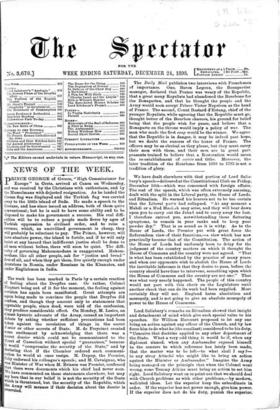Lord Salisbury's remarks on Ritualism showed that insight and detachment
of mind which give such special value to his speeches. Sir William Harcourt proposed to let any one bring an action against any officer of the Church, and by law force him to do what he (the assailant) considered to be his duty. "Conceive that doctrine applied to any other department of the State. What a very odd thing it would be if, when any diplomat sinned, when any Ambassador exposed himself to the censure to which reference has lately been made, that the matter was to be left—to what shall I say ?— to any stray Attache who might like to bring an action against the Minister or Ambassador." Imagine the Army being managed on the principle that when the Colonel went wrong, some Tommy Atkins must bring an action to set him right. Lord Salisbury went on to point out that we should deal with Church problems as with other problems,—by modern, well-tried ideas. Let the superior keep the subordinate in order. If the superior has not power enough, give him power. If the superior does not do his duty, punish the superior. " That seems to me to be the philosophy of discipline in all departments of administration, and I despair of the idea of obtaining the same results from a general mêlée of all the people whose 'passions may induce them to enter the Law. courts." No doubt the analogy between the Church and the secular services is not perfect, but in the ease under consideration it affords a very useful illustration of the folly of securing discipline by the miscellaneous issue of writs and what Burke called "plodding with attorneys."







































